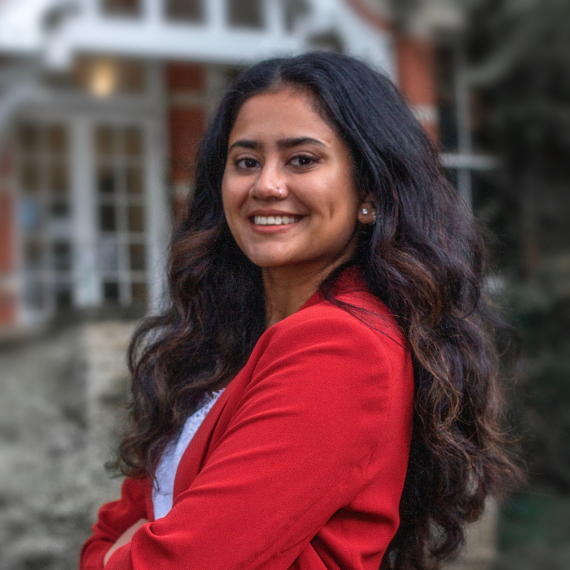
Anindita (Dita) Ponkshe is an undergraduate student in the Honours Political Science program. She is immersed in a number of extracurriculars on campus and firmly believes that experiential learning opportunities are critical for growth. She is also the recipient of the Class of 1983 Political Science Scholarship, Class of Mac 1964 Scholarship, CSAHS SA Student Leader Scholarship, and Willson Woodside Memorial Scholarship, alongside her renewable entrance scholarship.
Experience: Your Biggest Friend Outside of the Classroom
Getting involved matters for your personal and professional growth.
I moved to Canada a little over a decade ago, having grown up in India and the Middle East. I am a first-generation Canadian who came here with my family, with no ties. It was the extracurriculars that I immersed myself in at the University of Guelph that allowed me to gain the skills needed in applying to governmental and research-based positions. Additionally, I am a student who has successfully balanced work and studies simultaneously throughout my undergraduate years, which makes me appreciate the flexibility provided by experiential learning opportunities.
My Journey with Experiential Learning Opportunities
I started my journey as an undergraduate student at U of G as an Honours Political Science major and joined extracurriculars to get to know other students. I joined the Pre-Law Society and the Political Science Society in my first year and also tried my hand at legal advocacy competitions. Here, I truly enjoyed the friendly community fostered and in my second year I assumed the role of the newly-created position of Diversity Outreach Commissioner (DOC) for Pre-Law and also the Vice President of Academic Affairs for the Poli-Sci Society — making me the youngest executive member on both societies.
As the DOC, I introduced students to the law school admissions process, invited law school admissions officers, and Black, Indigenous, and People of Colour (BIPOC) industry professionals to speak with our students. At the end of my second year, I ran for presidency and became the youngest female to have been President of Pre-Law. Recognizing that the field of law still lacks diversity, alongside my Co-President, I created an executive team that was 42% BIPOC. Understanding the value of mentorship, I also independently founded the Peer Mentorship Program that pairs 36 mentees with individuals who can help guide them into a career in law. Since then, I have been re-elected as President for my final year at Guelph and I cannot wait to see all that we will achieve after just concluding our most successful year.
As the VP of Academic Affairs for the Political Science Society, I hosted our first-ever Thesis Conference, which invites professors within the Political Science department and a current student taking the thesis route to inspire more students to consider independent research. Assuming this role for a third year, I prepare and host this conference annually, while allowing students to ask questions to the most knowledgeable individuals in the field.
Okay, Extracurriculars Are Great, but How Do They Apply in the Real World?
These experiential learning opportunities allowed me to demonstrate leadership and problem-solving qualities to employers and have tremendously helped my professional growth. The strong communication and organization skills gained from the Poli-Sci Society allowed me to obtain a position working in the Ontario government in communications and political research, while also presenting me with the opportunity to work with a Minister provincially. Additionally, my commitments in Pre-Law allowed me to hone my critical research and writing skills working as a Junior Policy Analyst for the Government of Canada in Public Safety. In this position, I worked on interesting files pertaining to policing and worked with an incredible team!
Being part of clubs on campus also helps form meaningful relationships with professors, which extend beyond the classroom. Based on my involvement, I was invited by the Faculty Advisor and Acting Chair to hold a seat on the Political Science Undergraduate Committee and become a Political Science Peer Contact. These connections go a long way in shaping professional growth. I currently work as an Undergraduate Research Assistant with Dr. Yule on the topic of bail and am able to use the knowledge gained from participating in these valuable experiential learning opportunities in this position. I will also be presenting a separate research abstract in Montreal at the end of this year, which another professor believed would fit my interests.
Participating in extracurriculars shows your commitment to your major, but it especially shows employers and professors that you are taking your degree one step further and applying it outside of the classroom, while also providing opportunities for other students. In doing this, it also allows you to demonstrate your commitment to the school’s community in applying for multiple scholarships, which I am extremely grateful to have received from the College of Social and Applied Human Sciences. Simply put, experiential learning opens doors to getting the most out of your degree.
Final Thoughts
I am incredibly proud of the impact my leadership and involvement have had over the years, but I leave students with one piece of advice: Join the society that you always see advertisements for on campus. Recognize that your voice matters, that you have a lot to offer in contributing to that club, and that the experiential learning opportunity will only benefit you moving forward.